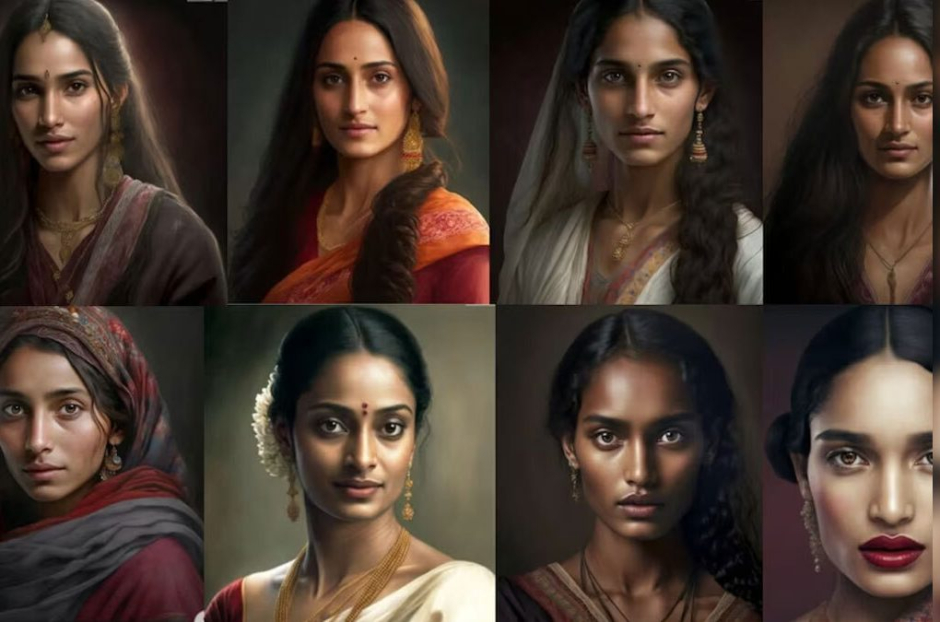What constitutes beauty in a woman from India, the Philippines, or Laos? This question has recently gained attention, with Artificial Intelligence (AI) offering its take. Images of “beautiful women” from different corners of the world, generated by AI, have become a viral trend. For instance, a TikTok video showcasing AI-crafted images of South and East-Asian women, posted by an account named AI World Beauties, has amassed over 1.7 million views.
Despite their popularity, experts warn that these AI-generated images might inadvertently reinforce biased viewpoints and harmful stereotypes due to their training on skewed datasets. Shibani Antonette, a data science and innovation lecturer at the University of Technology Sydney, explains that these images are crafted using “generative AI” or “GenAI” programs. These AI models, powered by machine learning, draw from vast amounts of data to create new content.
The efficacy of these AI image generators hinges on the diversity and quality of the training data. The creator of one such viral video revealed the use of a diffusion model called Midjourney for generating the images, yet declined to provide further details.
However, these AI-generated images often present a limited and exclusionary view of beauty, emphasizing features like fair skin, slim noses, full lips, and prominent cheekbones. These tendencies arise due to biases inherent in the data. Dr. Antonette warns that these models can magnify societal biases and stereotypes related to race and gender, leading to images that promote colorism and cultural beauty norms.

Asia Jackson, a Black and Filipino content creator, emphasizes that racial categories encompass a wide spectrum of features, making it problematic when AI-generated images narrowly define those features. She acknowledges that AI mirrors human behavior, whether inclusive or not, and while it’s difficult to encompass the vast diversity of features in a short video, it’s essential to remain critical of such representations.

Ishara Sahama, co-founder of a strategic design agency, laments that these AI images perpetuate generalized beauty standards for each ethnic group. The diversity within each country’s population is flattened into a single model, disregarding the complexity of appearances within those groups. She believes that AI has the potential to challenge perspectives, but its output is limited by the data it’s exposed to.

Kriti Gupta, an Indian Australian, points out that AI-generated images often align with societal preferences for certain ethnic features. These images cater to a predefined notion of attractiveness. Furthermore, AI often leans towards Western ideals due to the biases in the algorithms and data sources, which can lead to a white-washed version of beauty.
It’s a well-documented fact that AI datasets can be biased, leading to problematic outcomes. Research from Cornell University highlights how AI models associated lighter skin tones with higher-paying professions and darker skin tones with lower-paying jobs, further highlighting the consequences of racial bias in AI.
Addressing these issues requires multifaceted efforts. Tech developers and companies should diversify their datasets and avoid over-representing specific groups. Researchers should enhance transparency by sharing open-source models for critique and improvement. Users should engage with AI critically and responsibly to prevent the perpetuation of harmful stereotypes.
Ultimately, embracing diversity in data and using AI tools thoughtfully can contribute to a future where AI benefits everyone without propagating damaging stereotypes.
In the quest to rectify the biases and limitations in AI-generated images, it’s crucial for both creators and users of AI technology to recognize the profound impact these representations can have on societal perceptions. The challenge lies in fostering an AI landscape that not only reflects the rich diversity of human appearances but also challenges preconceived notions of beauty. By collectively prioritizing fairness, transparency, and inclusivity, we can pave the way for AI to evolve into a force that empowers and enlightens, rather than perpetuates harmful biases.
Read More:











